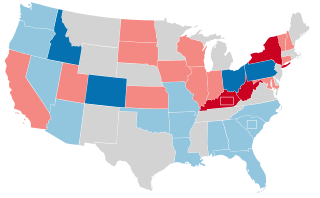
Benjamin Everett Jordan was an American businessman and politician. A member of the Democratic Party, he served as a United States Senator from North Carolina from 1958 to 1973.

The 1978 United States Senate elections were held on November 7, in the middle of Democratic President Jimmy Carter's term. The 33 seats of Class 2 were contested in regular elections. Special elections were also held to fill vacancies.

The 1974 United States Senate elections were held on November 5, with the 34 seats of Class 3 contested in regular elections. They occurred in the wake of the Watergate scandal, Richard M. Nixon's resignation from the presidency, and Gerald Ford's subsequent pardon of Nixon. Economic issues, specifically inflation and stagnation, were also a factor that contributed to Republican losses. As an immediate result of the November 1974 elections, Democrats made a net gain of three seats from the Republicans, as they defeated Republican incumbents in Colorado and Kentucky and picked up open seats in Florida and Vermont, while Republicans won the open seat in Nevada. Following the elections, at the beginning of the 94th U.S. Congress, the Democratic caucus controlled 60 seats, and the Republican caucus controlled 38 seats.

The 1972 United States Senate elections were held on November 7, with the 33 seats of Class 2 contested in regular elections. They coincided with the landslide re-election of Republican President Richard Nixon. Despite Nixon's landslide victory, Democrats increased their majority by two seats. The Democrats picked up open seats in Kentucky and South Dakota, and defeated four incumbent senators: Gordon Allott of Colorado, J. Caleb Boggs of Delaware, Jack Miller of Iowa, and Margaret Chase Smith of Maine. The Republicans picked up open seats in New Mexico, North Carolina, and Oklahoma, and defeated one incumbent, William B. Spong Jr. of Virginia.

The 1968 United States Senate elections were elections for the United States Senate. Held on November 5, the 34 seats of Class 3 were contested in regular elections. They coincided with the presidential election of the same year. The Republicans picked up five net seats in the Senate. This saw Republicans win a Senate seat in Florida for the first time since Reconstruction.

The 1966 United States Senate elections were elections on November 8, 1966, for the United States Senate which occurred midway through the second term of President Lyndon B. Johnson. The 33 seats of Class 2 were contested in regular elections. Special elections were also held to fill vacancies. With divisions in the Democratic base over the Vietnam War, and with the traditional mid-term advantage of the party not holding the presidency, the Republicans took three Democratic seats, thereby breaking Democrats' 2/3rds supermajority. Despite Republican gains, the balance remained overwhelmingly in favor of the Democrats, who retained a 64–36 majority. Democrats were further reduced to 63–37, following the death of Robert F. Kennedy in June 1968.

The 1964 United States Senate elections were held on November 3. The 33 seats of Class 1 were contested in regular elections. Special elections were also held to fill vacancies. They coincided with the election of President Lyndon B. Johnson by an overwhelming majority, to a full term. His Democratic Party picked up a net two seats from the Republicans. As of 2023, this was the last time either party has had a two-thirds majority in the Senate, which allowed the Senate Democrats to override a veto, propose constitutional amendments, or convict and expel certain officials without any votes from Senate Republicans. However, internal divisions would have prevented the Democrats from having done so. The Senate election cycle coincided with Democratic gains in the House in the same year.

The 1962 United States Senate elections was an election for the United States Senate. Held on November 6, the 34 seats of Class 3 were contested in regular elections. Special elections were also held to fill vacancies. They occurred in the middle of President John F. Kennedy's term. His Democratic Party made a net gain of four seats from the Republicans, increasing their control of the Senate to 68–32. However, this was reduced to 67–33 between the election and the next Congress, as on November 18, 1962, Democrat Dennis Chávez, who was not up for election that year, died. He was replaced on November 30, 1962, by Republican appointee Edwin L. Mechem. Additionally, Democrat Strom Thurmond became a Republican in 1964, further reducing Democrats to 66–34. This was the first time since 1932 that Democrats gained seats in this class of Senators.

The 1960 United States Senate elections coincided with the election of John F. Kennedy as president on November 8, 1960. The 33 seats of Class 2 were contested in regular elections. A special election was also held on June 28, 1960, for a mid-term vacancy in North Dakota where Democrats flipped a seat to expand their majority to 66–34. As Majority Leader Lyndon Johnson was elected Vice President, Mike Mansfield became the new majority leader.

The 1958 United States Senate elections were elections for the United States Senate which occurred in the middle of President Dwight D. Eisenhower's second term. Thirty-two seats of Class 1 were contested in regular elections, the new state of Alaska held its first Senate elections for its Class 2 and 3 seats, and two special elections were held to fill vacancies.

The 1956 United States Senate elections were elections for the United States Senate that coincided with the re-election of President Dwight D. Eisenhower. The 32 seats of Class 3 were contested in regular elections, and three special elections were held to fill vacancies. Although Democrats gained two seats in regular elections, the Republicans gained two seats in special elections, leaving the party balance of the chamber unchanged.

The 1954 United States Senate elections was a midterm election in the first term of Dwight D. Eisenhower's presidency. The 32 Senate seats of Class 2 were contested in regular elections, and six special elections were held to fill vacancies. Eisenhower's Republican party lost a net of two seats to the Democratic opposition. This small change was just enough to give Democrats control of the chamber with the support of an Independent who agreed to caucus with them, he later officially joined the party in April 1955.

The North Carolina United States Senate election of 1972 was held on 7 November 1972 as part of the nationwide elections to the Senate, and coinciding with the 1972 presidential election. The general election was fought between the Republican nominee Jesse Helms and the Democratic nominee Rep. Nick Galifianakis. Helms won the election, becoming the first Republican to win a Senate seat in North Carolina since 1897, and the first to hold this seat since 1871.

The North Carolina United States Senate election of 1968 was held on 5 November 1968 as part of the nationwide elections to the Senate. The general election was fought between the Democratic incumbent Sam Ervin and the Republican nominee Robert Somers. Ervin won re-election to a third full term, with over 60% of the vote. This was the last time any incumbent was re-elected in this seat until 2010. To date, this is also the last time a Democrat was re-elected as a senator in North Carolina.

The 1958 United States Senate special election in North Carolina was held on November 4, 1958. Interim Democratic Senator B. Everett Jordan was elected to complete the unexpired term of Senator W. Kerr Scott, who had died in April.

The 1958 United States Senate election in Wyoming took place November 4, 1958. Incumbent Republican Senator Frank A. Barrett ran for re-election to his second term. He was challenged by Gale W. McGee, a University of Wyoming professor and the Democratic nominee. Despite the state's strong Republican lean, McGee ran an energetic campaign against Barrett, earning the support of the national Democratic establishment. McGee ultimately narrowly upset Barrett, winning 51% of the vote to Barrett's 49%.

The 1960 United States Senate election in Oklahoma took place on November 8, 1960. Incumbent Democratic Senator Robert S. Kerr ran for re-election to a third term. He won the Democratic primary in a landslide and then faced former U.S. Attorney B. Hayden Crawford, the Republican nominee, in the general election. Even as Vice President Richard Nixon was winning Oklahoma in a landslide over John F. Kennedy, Kerr was able to defeat Crawford by a wide margin, winning his third term. However, Kerr died just shy of two years into his third term, on January 1, 1963. He was replaced by Governor J. Howard Edmondson in the Senate and a special election was held in 1964.

The 1960 United States Senate election in Rhode Island took place on November 8, 1960. Incumbent Democratic U.S. Senator Theodore F. Green did not seek re-election. Democrat Claiborne Pell won the seat, defeating Republican Raoul Archambault Jr.

The 1966 United States Senate election in North Carolina was held on November 8, 1966. Incumbent Democratic Senator B. Everett Jordan was re-elected to a second term in office over Republican businessman John Shallcross. Democrats would not win this seat again until 2008.
Senator Jordan may refer to:




















